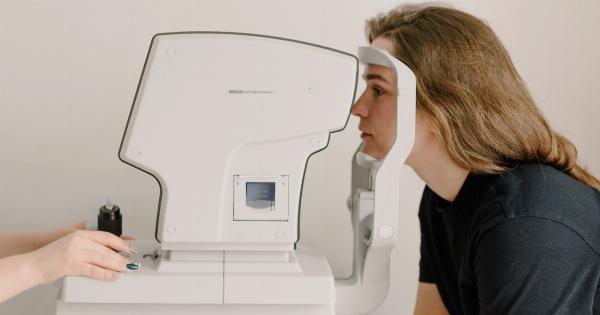It is common knowledge that ophthalmologists help people improve their vision by diagnosing and treating eye conditions and diseases.
But, can ophthalmological exams detect mental disorders? The answer is that they can provide some clues, but a definitive diagnosis of mental disorders requires a thorough psychiatric evaluation. In this article, we will discuss the relationship between eye health and mental health, the potential role of ophthalmological exams in detecting mental disorders, and the limitations of these exams.
The Connection between Eye Health and Mental Health
The eyes are not just the windows to our soul, but also to our brain. The visual system is closely connected to different parts of the brain involved in emotions, cognition, and behavior.
Therefore, changes in the eyes and visual function can reflect underlying problems in mental health. For example:.
- Depression: Depression is associated with changes in the pupil size, color vision, and contrast sensitivity. Patients with depression may also have decreased eye movement and fixation.
- Schizophrenia: Schizophrenia is linked to abnormal eye movements, particularly in tracking objects and smooth pursuit. Patients with schizophrenia also have difficulties with visual perception and processing.
- Alzheimer’s disease: Alzheimer’s disease affects the vision by causing visual hallucinations, loss of depth perception, and problems in visual recognition. Patients with Alzheimer’s disease may also have a reduced peripheral vision.
- Post-traumatic stress disorder (PTSD): PTSD is associated with changes in the visual field, particularly in the attentional bias towards threat-related stimuli. Patients with PTSD also have increased eye blinking and startle responses.
These are just a few examples of how eye health and mental health are connected, and how ophthalmological exams can provide some clues about underlying mental disorders.
However, it is essential to note that ophthalmologists are not mental health professionals, and a definitive diagnosis of mental disorders requires a psychiatric evaluation.
The Role of Ophthalmological Exams in Detecting Mental Disorders
Ophthalmological exams include different techniques and procedures that evaluate different aspects of eye health, such as:.
- Visual acuity: This tests the ability of the eyes to see letters, numbers, and symbols on a chart at a distance.
- Refraction: This measures how well the eyes can focus on objects and determines the need for eyeglasses or contact lenses.
- Eye movement: This assesses the ability of the eyes to follow objects, change focus, and maintain fixation.
- Eye pressure: This measures the intraocular pressure and evaluates the risk of glaucoma.
- Eye dilation: This enlarges the pupils and allows the ophthalmologist to examine the inside of the eye, including the retina, optic nerve, and blood vessels.
Although ophthalmological exams are not designed to diagnose mental disorders, they can provide some useful information that can help mental health professionals in their assessment and diagnosis. For instance:.
- Pupil size: The size of the pupils can indicate changes in the autonomic nervous system, which is responsible for regulating emotions and stress response. Patients with anxiety, depression, or PTSD may have abnormal pupil size or reactivity to light.
- Optic nerve abnormalities: The optic nerve connects the eye to the brain and is responsible for transmitting visual information. Abnormalities in the optic nerve can result from optic neuritis, multiple sclerosis, or other neurological conditions that affect mental health.
- Retinal changes: The retina is a thin layer of tissue at the back of the eye that contains cells sensitive to light. Changes in the retinal structure or function can indicate vascular problems, diabetes, high blood pressure, or other systemic conditions that have implications for mental health.
- Eye movement abnormalities: Abnormal eye movements, such as nystagmus, or jerky eye movements, can occur in patients with neurological or psychiatric disorders, such as schizophrenia, bipolar disorder, or drug abuse.
Therefore, ophthalmological exams can provide some clues about underlying mental disorders, but a diagnosis can only be made by a mental health professional after a thorough evaluation of symptoms, history, and psychometric tests.
The Limitations of Ophthalmological Exams in Detecting Mental Disorders
Ophthalmological exams are not designed to diagnose mental disorders, and therefore have limitations in their ability to detect them accurately. Here are some of the reasons:.
- Eye changes are not specific to mental disorders: Many eye changes can occur in patients with various systemic or neurological conditions, not just mental disorders. Therefore, ophthalmological exams alone cannot provide conclusive evidence of a mental disorder.
- Psychological factors can affect eye function: Anxiety, fear, or stress can affect the results of ophthalmological tests, especially those that require focus and attention. Patients with mental disorders may experience changes in their eye function due to their emotional state, which can mask or mimic other eye conditions.
- Comorbidity is common: Mental disorders often coexist with other medical conditions, such as diabetes, hypertension, or autoimmune diseases. These comorbidities can affect the visual system and confound the results of ophthalmological exams.
- Patient compliance can vary: Ophthalmological exams require patient cooperation and compliance, which can be affected by their mental state or cognitive abilities. Patients with severe mental disorders may have difficulties in following instructions or expressing their symptoms, which can limit the accuracy of the exams.
Therefore, ophthalmologists should be aware of the potential role of ophthalmological exams in detecting mental disorders, but they should also refer patients to mental health professionals for a comprehensive evaluation and treatment.
The Bottom Line
Can ophthalmological exams detect mental disorders? The answer is that they can provide some clues, but a definitive diagnosis of mental disorders requires a thorough psychiatric evaluation.
Ophthalmological exams can help mental health professionals in their assessment and diagnosis by providing information about eye health and function that may be relevant to mental health. However, ophthalmological exams alone cannot diagnose mental disorders, and therefore should be considered as complementary rather than diagnostic tools.
Patients who suspect they have a mental disorder should seek the evaluation of a mental health professional.































